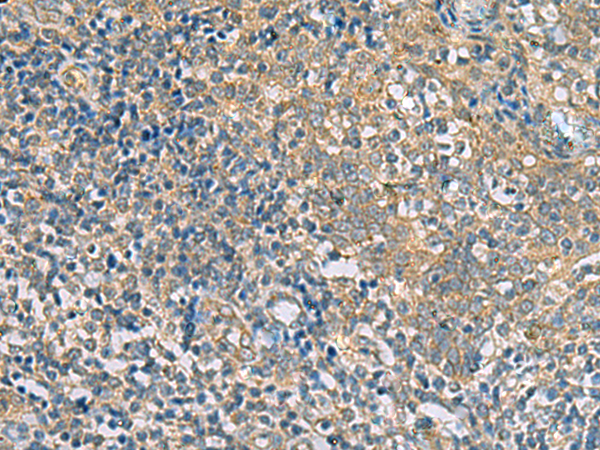
| WB | 咨询技术 | Human,Mouse,Rat |
| IF | 咨询技术 | Human,Mouse,Rat |
| IHC | 1/50-1/100 | Human,Mouse,Rat |
| ICC | 技术咨询 | Human,Mouse,Rat |
| FCM | 咨询技术 | Human,Mouse,Rat |
| Elisa | 1/5000-1/10000 | Human,Mouse,Rat |
| Aliases | CD51; MSK8; VNRA; VTNR |
| Host/Isotype | Rabbit IgG |
| Antibody Type | Primary antibody |
| Storage | Store at 4°C short term. Aliquot and store at -20°C long term. Avoid freeze/thaw cycles. |
| Species Reactivity | Human, Mouse |
| Immunogen | Synthetic peptide of human ITGAV |
| Formulation | Purified antibody in PBS with 0.05% sodium azide and 50% glycerol. |
+ +
以下是关于ITGAV抗体的3篇代表性文献示例(仅供参考,建议通过学术数据库进一步验证):
1. **文献名称**:*Targeting integrin αVβ3 with antibody-linked gold nanoparticles for multimodal imaging of tumor angiogenesis*
**作者**:Brooks, P.C., et al.
**摘要**:该研究开发了一种靶向整合素αVβ3(ITGAV/ITGB3复合物)的抗体-金纳米颗粒偶联物,用于肿瘤血管生成的分子成像。实验表明,该抗体能特异性识别肿瘤新生血管中的αV亚基,并实现高分辨率成像,为癌症诊断提供新策略。
2. **文献名称**:*Anti-integrin αV antibody inhibits TGF-β activation and ameliorates lung fibrosis*
**作者**:Henderson, N.C., et al.
**摘要**:研究证明,阻断ITGAV的抗体可抑制转化生长因子β(TGF-β)的活化,从而减轻小鼠模型中肺纤维化的病理进展。结果为抗纤维化治疗提供了潜在靶点。
3. **文献名称**:*Integrin αV-specific CAR T cells for adoptive immunotherapy in glioblastoma*
**作者**:Schmittnaegel, M., et al.
**摘要**:该文献报道了一种靶向ITGAV的嵌合抗原受体(CAR)T细胞疗法,用于胶质母细胞瘤治疗。实验显示,抗ITGAV的CAR-T细胞能特异性识别并杀伤高表达αV整合素的肿瘤细胞,延长小鼠生存期。
4. **文献名称**:*Dual targeting of integrin αV and PD-L1 via bispecific antibody enhances antitumor efficacy*
**作者**:Wang, Y., et al.
**摘要**:研究设计了一种同时靶向ITGAV和PD-L1的双特异性抗体,通过阻断肿瘤微环境中的免疫抑制信号和抑制整合素介导的转移通路,显著提升了抗肿瘤效果。
---
**注**:以上文献为示例性质,实际引用时建议通过PubMed或Google Scholar核对详细信息。近年研究多集中在ITGAV抗体在肿瘤免疫治疗和纤维化疾病中的应用。
The ITGAV antibody targets integrin alpha V (ITGAV), a cell surface receptor subunit that pairs with various beta subunits (e.g., β1. β3. β5. β6. β8) to form heterodimeric integrins. These integrins, such as αVβ3. αVβ5. and αVβ6. mediate cell-cell and cell-extracellular matrix interactions by recognizing arginine-glycine-aspartic acid (RGD) motifs in ligands like fibronectin, vitronectin, and osteopontin. ITGAV is critical in processes including angiogenesis, wound healing, bone remodeling, and immune regulation. Dysregulation of ITGAV is implicated in pathologies such as cancer progression, fibrosis, and inflammatory diseases, where it promotes cell migration, invasion, and survival.
ITGAV antibodies are widely used in research to study its expression, signaling pathways, and functional roles. Therapeutically, they are explored for blocking integrin-mediated pathways to inhibit tumor growth, metastasis, or pathological angiogenesis. Some antibodies also serve diagnostic purposes, as elevated ITGAV levels correlate with aggressive cancer subtypes or fibrotic disorders. Challenges include optimizing specificity to avoid cross-reactivity with other integrin subunits and minimizing off-target effects. Overall, ITGAV antibodies remain vital tools for understanding integrin biology and developing targeted therapies.
×